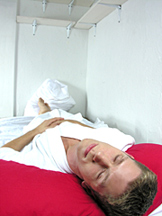The Curse Of Jet Lag
“Arrrgghhh” there i go again, waking up in the middle of the night and feeling wide awake in my bed at 2 a.m. I keep tossing and turning in my bed for the next one hour feeling so alert and yet helpless about not being able to enter my dream world again. It's been almost a week ever since i returned from my major trip to London and Italy this year. I am still not adjusting back to my usual sleeping patterns. I have started working out at the gym, but my strength level has dropped a lot, i am not lifting the usual weights i used to be, my endurance level was not what it used to be when i attended my favorite cardio class. I even tried sleeping early and as far as possible, i cannot help but feel more exhausted than ever. Does this sound familiar to you? If the answer is yes, read on to find out more!
 The earth is divided into 24 time zones. Time changes by one hour for every 150 degrees of travel east or west of the Greenwich meridian. Most people who are frequent travelers would have already experienced by what we called "Jet lag" or "desynchronosis". This is especially so if they travel longer distances across the globe. Depending on the direction of flight you are going, flying eastwards tend to result in difficulty in sleeping, while flying westwards, tend to result in early awakenings in the morning. The symptoms of jet lag are in general more severe when you cross more time zones and usually more for eastward flights than westward flights.
The earth is divided into 24 time zones. Time changes by one hour for every 150 degrees of travel east or west of the Greenwich meridian. Most people who are frequent travelers would have already experienced by what we called "Jet lag" or "desynchronosis". This is especially so if they travel longer distances across the globe. Depending on the direction of flight you are going, flying eastwards tend to result in difficulty in sleeping, while flying westwards, tend to result in early awakenings in the morning. The symptoms of jet lag are in general more severe when you cross more time zones and usually more for eastward flights than westward flights.
Jet lag is a physiological condition where your body clock becomes out of sync with the destination time when traveling across time zones. This is a temporary disorder where most people may feel fatigue, suffer from insomnia, anxiety, dehydration, headache, nausea, sweating, irritability, constipation, coordination problems, diarrhea, memory loss. Some people may suffer from additional symptoms such as increased susceptibility to illness and heartbeat irregularities. Jet lag affects everybody. Statistics show that millions of people are affected by jet lag every year. People who are over the age of 50 will more likely experience jet lag when compared with individuals under the age of 30. Jet lag is classified as one of the 80 plus known sleeping disorders.
Here are 10 tips to combating jet lag:
Tip #1 - Hydrate yourself with lots of water, it is one of the keys of life!
Tip #2 - Plan your trips ahead and rest well before and after each trip.
Tip #3 - Prepare sleeping aids such as ear plugs, blindfolds ...etc to aid in having quality sleep when flying.
Tip #4 - Set your watch to the new time zone and start adjusting your sleeping patterns accordingly.
Tip #5 - Move around on the air craft and do stretching exercises to reduce discomfort.
Tip #6 - Drink lesser alcohol to prevent dehydration.
Tip #7 - Eat lighter on board the air craft to prevent bloating due to the cabin pressure.
Tip #8 - Lesser stimulants such as caffeine before bed time.
Tip #9 - Head for the sunshine when you arrived at your destination.
Tip #10 - Try to sleep when its night time and awake when its day time.
Stave off the adverse effects of jet lag with these tips. Traveling doesn't have to be ruined by jet lag.
For further information, visit the following sites:






